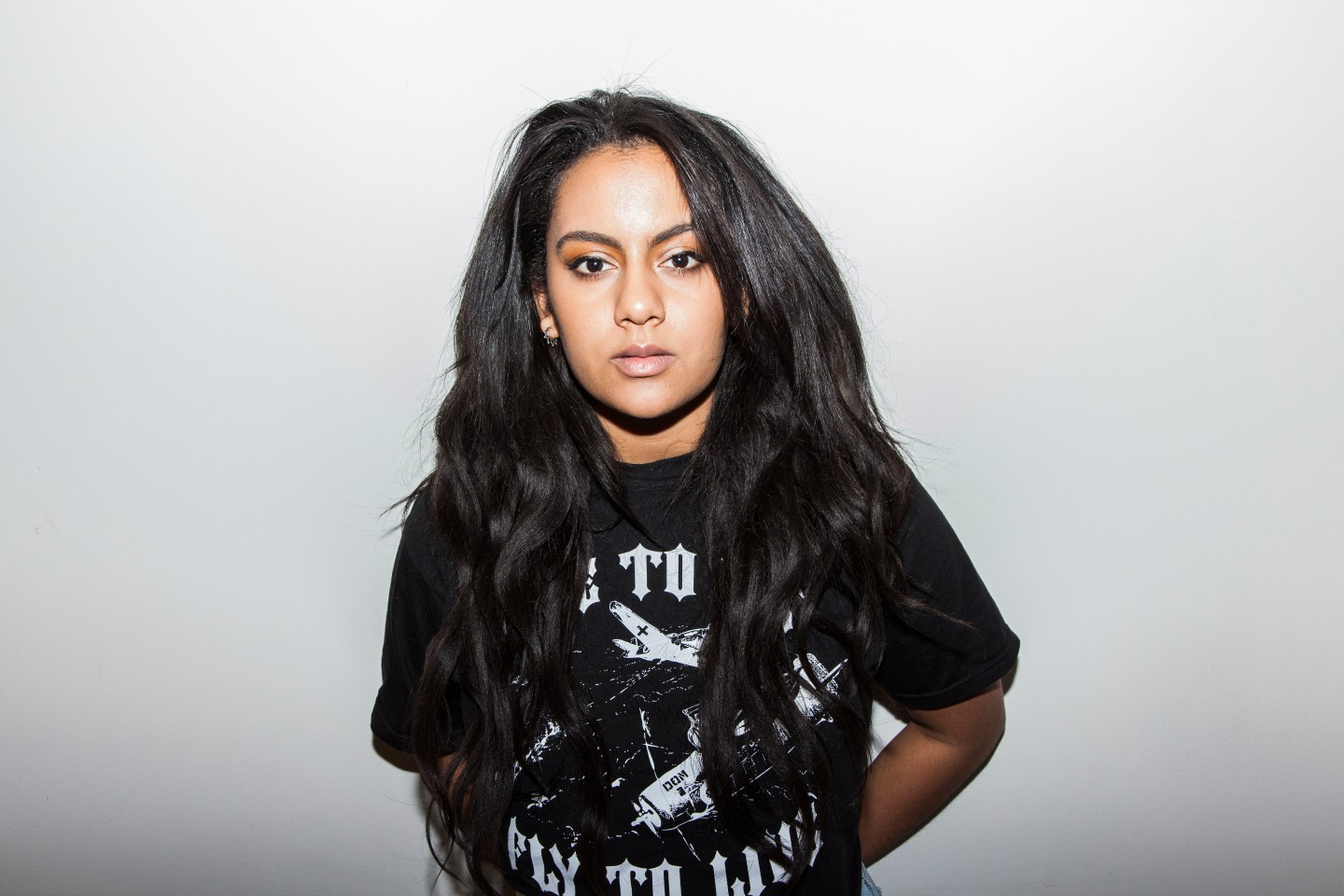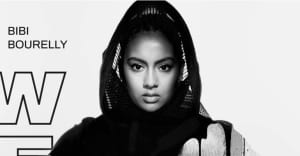Bibi Bourelly Would Go Crazy If It Weren’t For Music
The 21-year-old singer on missing the school bus, writing songs for Rihanna, and her debut album.

21-year-old Bibi Bourelly has been writing songs since she was a child. But, during a recent visit to The FADER's office in N.Y., she described the practice—which has since come to define her life—as less a creative habit and more a restless need: "I really see myself as somebody who goes crazy in my fucking house and can't think of anything else [except] write millions of songs."
Born to two creatives in Berlin, Bourelly grew up between Germany's bohemian capital and Washington D.C., where she later lived with extended family after her mother passed away. Upon graduating high school, she moved west to L.A. to link with a manager who had seen videos of her singing on Instagram. "I wasn't trying to be rebellious," she says. "I was just like, 'Dude, I'm gonna be fucked if I don't do this.'"
It was a risk: "The whole fucking thing could have gone completely south because I didn't really do my research," she jokes. Luckily for Bourelly, it turned out to be the real deal: her manager finessed her a meeting with Kanye West that led to songwriting sessions with Rihanna and Usher, and subsequently a record deal of her own with Def Jam.
Bourelly has since penned three tracks for Rihanna's eighth album ANTI ("Yeah, I Said It," "Higher," and "Pose") and begun work on her own debut. Below, she speaks candidly on the sounds she grew up on, the risks she's taken, and the first time she met Rihanna.
What sort of music did you grow up around?
Bibi Bourelly: What I gravitate toward naturally is pop music. When I was younger, I liked Britney Spears and Destiny's Child. But my dad—he's a pretty well-known [jazz] musician, his name is Jean Paul Bourelly—always played this pretty prestigious kind of music around the house. And the people he always had around me were great musicians. In the car, he put me on to, like, Tribe Called Quest or Stevie Wonder. So I'm able to really understand musicianship and then I have a natural taste and love for pop music.
Where did you grow up?
Half of my life I lived in Berlin and the other half I lived in Washington D.C., but it was back and forth. My mom and dad lived in Berlin, but my mom passed away at a young age, which is initially why I ended up moving to Washington. I was there for three years in elementary school, and then in middle school I moved back to Berlin. I was there until the tenth grade, and I was just terrible in school. I had to dip, and so I dipped to D.C. again.
Berlin and Washington D.C. are very different cities.
I had a difficult time when I moved [to D.C.] because I was used to hopping on the train and buying weed and chilling with my homies and shit. Berlin is the most lit shit in the world. But in D.C., it was, like, a school fucking bus? You mean to tell me this nigga comes only once? Once! I missed that joint like every morning.
What was high school like for you?
I was bored. You know how you hear some people sing and you’re, like, “Oh, yeah, no—don't sing. It's not for you.” That’s the way I am with school. It would not have been a realistic thing to expect me to go to college, it would have been a disaster. So I finished high school and two months later I moved to L.A.
I was not trying to [graduate high school] at all but I'm happy I did it now. I feel like what school taught me was how to do something you don't want to do. And I think if I wouldn't have learned that lesson, I wouldn't have been able to finish half the stuff that I started in Los Angeles.
So you always knew you wanted to be in the music making business when you grew up? Did you have specific dreams of being a songwriter or singer?
I grew up writing—I would hear my dad playing around the house and I would just sing a top line over whatever he was playing. But I never went to L.A. and planned on writing. I wrote a song that got placed with Rihanna, that’s epic: I've worked with [Rihanna], and I'm not like somebody that’s been in the game for fifteen years as a writer; it just happened. Now I'm just focused on making dope music, I don't think about writer or artist. I don't really differentiate the two.
“I go to the studio and I get drunk as fuck, ‘cause I’m fucking nervous, and all of a sudden Rihanna walks in.”—Bibi Bourelly
You don't differentiate between when you write a song for Rihanna and she sings it and when you write a song for yourself?
Rihanna's an artist, but she's a different kind of artist. She's an entertainer, and when I look at myself I don't really see myself as an entertainer. I really see myself as somebody who goes crazy in my fucking house and can't think of anything else [except] write millions of songs. I mean everyone does that in different ways, but that's just my way.
How did you end up in the room with Rihanna so early in your career?
[It all came] through Kanye. My wonderful manager knows J. Cole, and so we got a meeting with Kanye. I was 19 [at the time]. I was scared as shit, but I have this thing that happens to me when I get scared—I think it’s a survival mechanism—but for some reason, I’m just like, fuck it. So we walked in and we played our record and this nigga is just chilling like, "You gotta nice voice."
At the end of the meeting, we were like, fuck it, that didn’t go well. We went to eat Caribbean food and talk about some other shit, and the next thing, we get a call like, "Yo, we want you to come in and write for Rihanna." So I go to the studio and I get drunk as fuck, 'cause I’m fucking nervous, and all of a sudden Rih walks in. She goes "Hi, I'm Rihanna." And I’m like, "Yeah, I know."
Did you learn anything working in those early sessions for Rihanna?
I still don't really feel differently. I don't look at my songwriting and say, “Oh this is so great,” or, “This is so bad.” It's just the shit that comes out of me. But I'm blessed to have had an opportunity like that. I think that if you’re around anybody that is a professional and great at what they do—which she is—you’re going to pick up things. Just off of being around them and hearing their conversations and seeing the way they work and those things. So I don’t know about anything in particular, but being around professionals, real professionals—it changed my life.
Now that you are working on music for yourself, how has your life and process changed?
I slowed the writing down right now. I’m not really focused on that right now. I’m just focused on creating my album. You have to remember I haven’t been in the game writing for hella fucking people. I was kind of just writing like for one person for like three months, Rih. And I was doing some shit for Usher at that time.
Your first three releases ("Riot," "Ego," and "Sally") have each been fueled by a certain frustration with feeling misunderstood. What other themes will you address on your album?
A lot of the songs that I'm going to be releasing now are about what I was experiencing at the early stages of my career and the things that the world missed. Before anyone knew who I was, me just really fucking mad at everybody for not understanding me. I think it's important that they get to see that.
I think that as time went past I've grown to realize that it's difficult to understand an obsession or a passion like mine. It's not normal. So I've become more accepting of it. My parents, even, having conversations with with them after my successes, they were like, “Well, what the fuck were we supposed to do? Were we supposed to believe a fourteen year old kid?"
